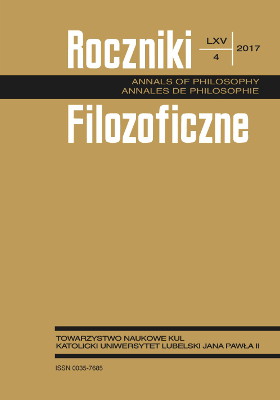Tomasz z Akwinu i Duns Szkot o przygodności, wolności i indywidualności
Thomas Aquinas and Duns Scotus on Contingency, Freedom and Individuation
Author(s): Michał PaluchSubject(s): Philosophy, Metaphysics
Published by: Towarzystwo Naukowe KUL & Katolicki Uniwersytet Lubelski Jana Pawła II
Keywords: Thomas Aquinas; Duns Scotus; contingency; freedom; individuation
Summary/Abstract: The paper attempts to present the fundamental perspectives which are necessary to understand Aquinas’s position on contingency, freedom and individuation in order to compare his thinking with Duns Scotus’s. The author wants to take into account Gilson’s warning: it is useless to compare chosen details of the aforementioned philosophical proposals, if there is no understanding of the deep difference between the metaphysical systems of the two philosophers.The first section presents the difference in the understanding of the relationship between nature and will. Duns Scotus interprets the will as opposed to nature and sees a truly free and Christian person acting as opposed to the deterministic operations of nature. For Aquinas the truly personal acting may be inscribed in nature as its free fulfilment. The difference is based on the different readings of Aristotle’s philosophy. The second section describes the difference in the understanding of the transcendence of the divine actions. Thomas uses a very strong concept of transcendence that allows him to accept the thesis that God’s immutable (= necessary) will achieves its purposes through the necessary and free (sic!) actions of the creatures (cf. De veritate, q. 6, a. 3, ad 3). Duns Scotus looks for a more intuitive understanding of the relationship between divine and human acting. Because of that he describes the divine actions as contingent, undertaken in the eternal “now”. The third section deals with the doctrine of individuation. Duns Scotus’s proposed solution to this problem is his famous form haecceitas. Although the form as the source of substantiality is the sign of individuality for Thomas, as well, in his case this has been achieved through individuation, and although he must have been aware of some difficulties in the classical Aristotelian position (matter as the main factor in individuation), he sticks to the Aristotelian solution, only slightly reformulating it (materia quantitate signata). There are two reasons for his fidelity to Aristotle in spite of doubts expressed by Albert the Great and Bonaventure: the stress on the hylemorphic structure of being and the attempt to articulate the consistency of the conceptual genera. The last problem leads to the main metaphysical difference of the analysed proposals. Duns Scotus as an essentialist has to inscribe everything that is real within the order of essence; Thomas articulates reality by taking into account essence and existence. His position opens wider possibilities for the understanding of being.
Journal: Roczniki Filozoficzne
- Issue Year: 65/2017
- Issue No: 4
- Page Range: 23-36
- Page Count: 14
- Language: Polish

